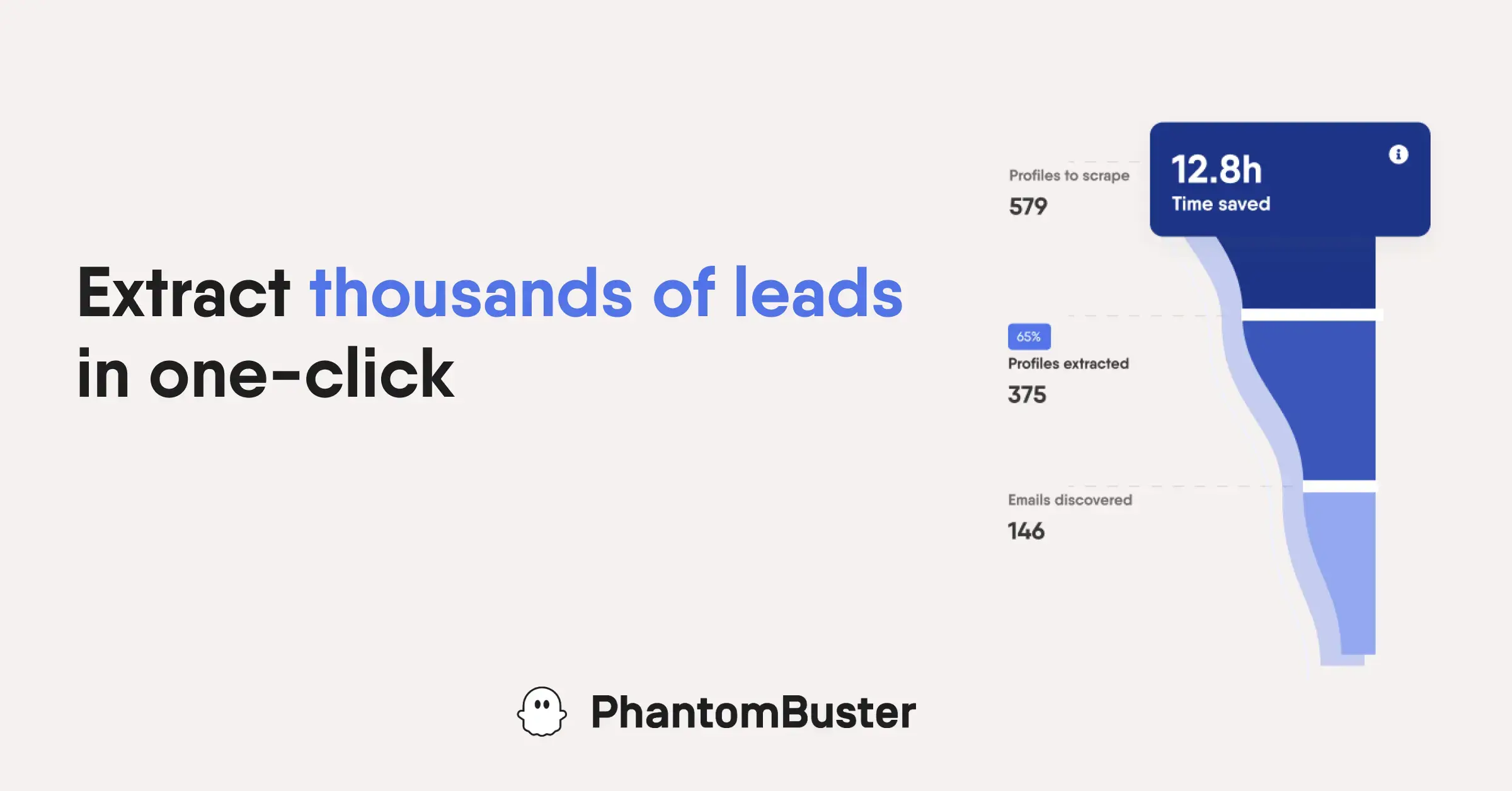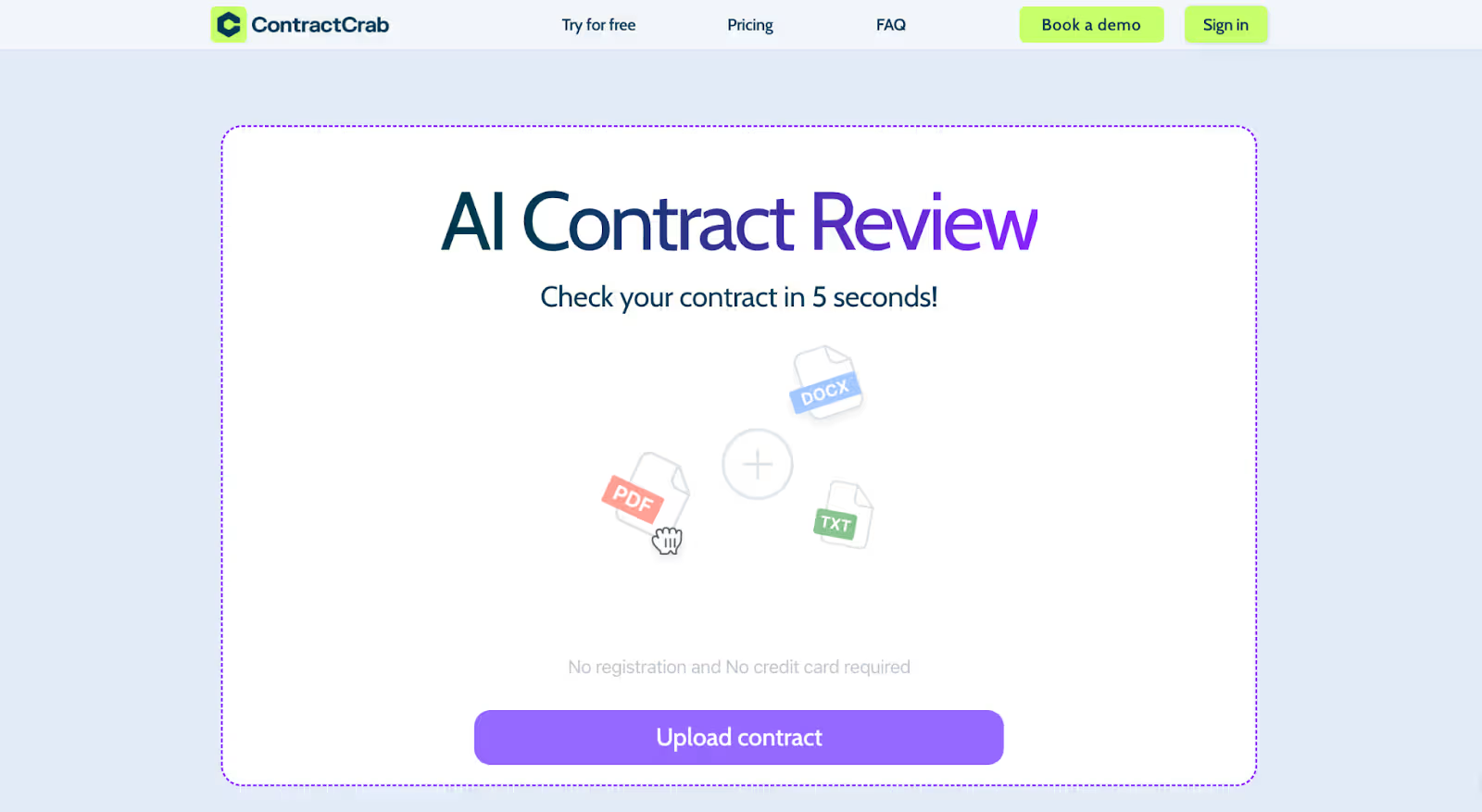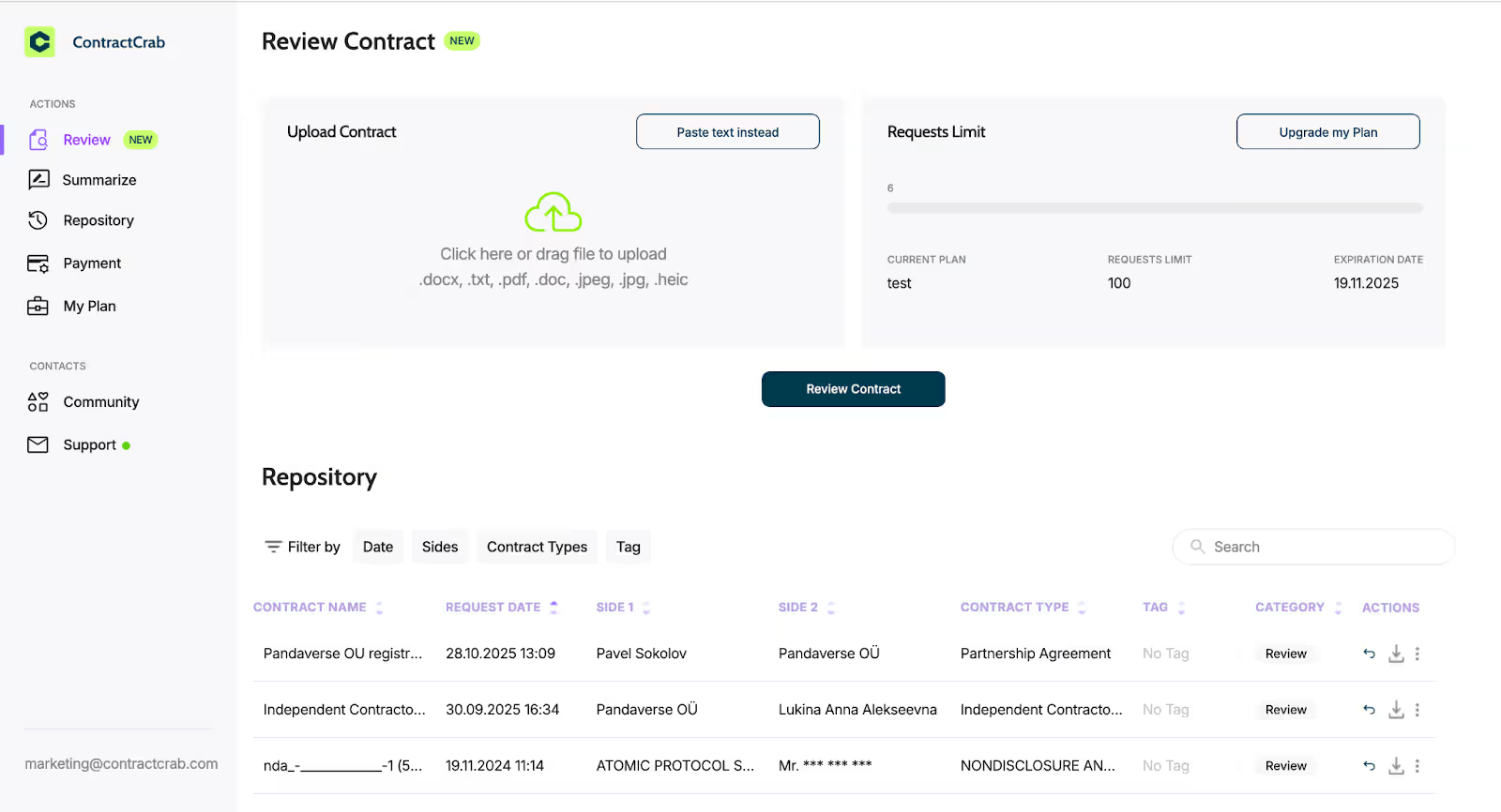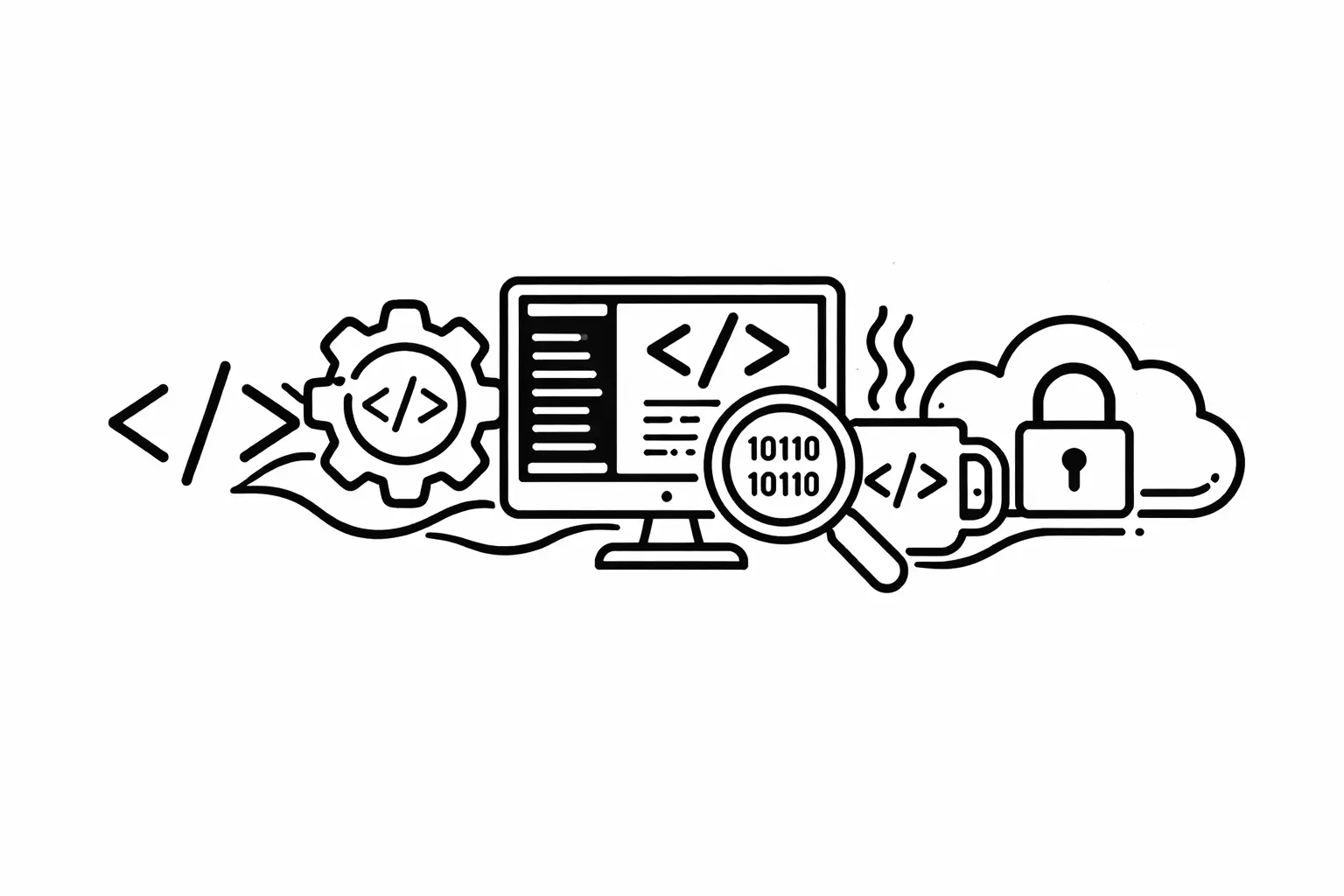Stop Drowning in Paperwork: How to Automate Contract Review with AI

Every vendor agreement, service contract, and NDA that lands on your desk needs a careful review.
Most business owners can attest to spending several hours each week combing through contracts, so it’s no surprise that many start looking for ways to offload the workload.
Until recently, the standard — and often only — option was to hand contract review over to a lawyer.
But with attorneys spending an average of 92 minutes per contract and charging anywhere from $150 to $500 per hour, the costs add up quickly.
For small businesses that sign multiple agreements each month, getting every contract professionally reviewed just isn’t realistic.
But what if we told you that with AI contract review tools, such as ContractCrab, you can scan contracts in minutes, flag risky clauses, extract key dates and obligations, and receive plain-English, easy-to-understand summaries of what you’re agreeing to — all for as little as $0.15 per contract?
ALSO READ: Introducing ChatGPT 5.1: Here's Everything You Need to Know

What is The Contract Review Process and Why Should You Implement It?
Contract review is the process of reading through an agreement in a structured way — often using a contract review checklist — before you sign it. The goal is to ensure that:
- The terms protect your interests
- You spot any unusual clauses that could cause problems later
- You fully understand every obligation you’re taking on
In the setting of a law firm, this work is done by a paralegal, who examines the document for legal issues and flags potential concerns. The contract is then passed to a senior attorney, who reviews those notes before sending the final version to business executives. That’s how larger companies make sure their contracts are airtight.
Fun fact: Fortune 1000 companies typically manage between 20,000 and 40,000 active contracts at any given time—and many have entire departments dedicated just to keeping everything organized.
Of course, this isn’t realistic for an average small business, yet the risks are practically the same.
Vendor agreements, client contracts, partnership deals, and NDAs all carry significant exposure. For example, an auto-renewal clause can lock you into paying for another term without realizing it, while unlimited liability provisions can spark disputes that give the other party the power to financially cripple your business.
In fact, research by Juro shows that 70% of businesses run into legal issues because their contracts weren’t properly reviewed.
The solution is essentially the same as it is for large enterprises: put a structured contract review process in place. This helps you reliably vet contracts before signing, spot red flags early, and protect the business you’ve worked hard to build.
What does differ is how a small business can realistically implement this. After all, you probably don’t have — or want to pay for — a whole team of lawyers
How to Review a Contract Without Being a Lawyer
The good news is that you don't need a law degree to review business contracts.
In fact, by using the method that lawyers use, which starts with the general and narrows down to the specifics, you can identify many red flags yourself.
This is actually very similar to debugging code or editing an article. Here's how to adapt this process to your business:
- First read-through. To get started, scan the entire contract to understand its overall purpose and structure. This prevents you from getting lost in details before grasping the big picture.
- Verifying information. Check that company names, addresses, and legal entities are correct and fully stated. Even a small typo like LLC vs Inc could potentially invalidate the contract.
- Outlining key numbers. Write down things like payment amounts, dates, and KPI into a separate list or a table — reviewing numbers this way is much easier than looking for them in a multi-page document.
- Flagging risks. Repeat for penalties, liabilities, and consequences of non-performance.
- Comparing against a standard contract. If you regularly sign contracts and have a standard one that you trust, it’s always a good idea to use it as a baseline and see if the new agreement has any sections that deviate from it. Deviations like that don't automatically mean something bad, but they're worth looking into.
To be balanced, even with a trained eye, it's possible to overlook red flags without legal knowledge. Not to mention, this entire process can take a long time.
That's where AI tools become very helpful. They can run through the same steps very quickly, finding problems for you to check.
3 Main Benefits of AI Contract Review
AI contract review tools do three things well: catch errors, flag unusual terms, and extract key information.
- AI-powered risk detection. For example, AI review software scans for contradictory clauses that could create problems. One page might say payment is due in 30 days, but another page might say 45 days. AI will flag the discrepancy and highlight it as a risk. Humans often miss errors like this.
- Compliance checking. The AI knows current GDPR requirements, state privacy laws, and industry regulations. When your vendor agreement includes outdated data retention language, the system alerts you immediately.
- Plain-English summaries. You will get a summary of important terms and data automatically. Instead of reading the entire contract and writing it down or trying to remember everything, you will get a list where everything is clear.
How to Integrate AI Contract Review Into Your Workflow
Now that we've cleared that up, let's talk about how to use an AI business contract review tool, such as ContractCrab in real life.

When to Use AI Review
It’s a good idea to always use it for standard contracts, as there’s very little downside to it. Standard contracts include but are not limited to:
- NDAs
- service agreements
- vendor contracts
Notably, these agreements follow a similar template and AI is very good at spotting deviations from these patterns.
To get the most value, use AI review a first pass to spotlight potential issues, and to get a quick summary.
Build a reference library of good contracts
It goes without saying that you should keep your contracts safe and organized. But besides general organization, there’s another reason for this: when AI flags something as unusual, you can quickly check it against your own small database to see if it's actually problematic.
Set a review threshold
Do you ever need to hire a lawyer? It depends on your risk tolerance, but one logical approach is to set a threshold based on the contract's value.
- For example, only use AI to review contracts under $50,000 to optimize legal costs.
- For contracts over $50,000, it may be worthwhile to use an AI service and consult a lawyer, as AI contract tools have limitations. For example, they cannot predict how regulations will change based on recent news and experience.
How to Choose the Right AI Tool for Your Business
AI contract review service is still a fairly new field, and the first tools to enter the market — like Spellbook and Legartis — were built for lawyers, not business owners. While you could use them, you’d end up overpaying for features you probably wouldn’t use, and ultimately getting less value.
When choosing a tool, pay attention to:
- The volume of contracts you review. If you handle fewer than 50 contracts per month, look for tools that offer pay-as-you-go pricing. This model is typically far more cost-effective for low volumes.
- The ease of use. Many online contract review tools designed for lawyers are highly customizable, which only makes sense if your company is at least mid-sized and ideally has a legal team. Otherwise, all that customization just creates extra overhead. For small businesses, it’s better to choose a simple “upload and forget” type of tool.
- Ease of onboarding. Enterprise-focused tools can be surprisingly difficult to set up. Before you can review your first contract, you may need to book a call with a sales rep, wait for a personalized quote, and then complete onboarding or training sessions. In contrast, on-demand tools let you activate a free trial and start reviewing contracts immediately.
- Security. The tool should have SOC 2 Type II certification and comply with GDPR/CCPA requirements. It should also use end-to-end (peer-to-peer) encryption to ensure your contracts cannot be leaked or intercepted.

If it offers a free trial or a money-back guarantee, upload a real contract you’ve already reviewed manually and check whether the AI flags the issues you already know are there.
Why Not Just Use ChatGPT?
It can seem like generative AI chatbots such as ChatGPT can replace specialized AI tools — but they can’t.
There are several reasons why:
- For one, chatbots can still hallucinate legal information, while dedicated AI contract-review tools generally do not. That’s because those tools are trained and fine-tuned very differently: they rely on carefully curated legal datasets and structured knowledge bases built by lawyers.
- ChatGPT generates answers from broad, general training data where legal content wasn’t the focus and where unverified information can slip in.
In short: don’t use ChatGPT to review contracts. The risk of mistakes is high, and those mistakes can have serious consequences.
The bottom line
In the US, lawyers charge between $150 and $500 for one hour of contract review.
On average, a contract review lasts 90 minutes.
This means that using a lawyer for contract review could cost between $225 and $750 per contract. Overall, contract review software can cost as little as $0.15. per contract. It is just as accurate and thorough as many lawyers.
























